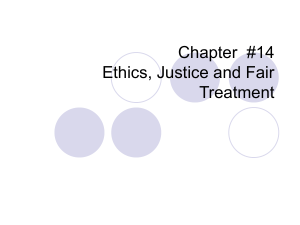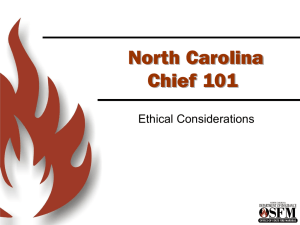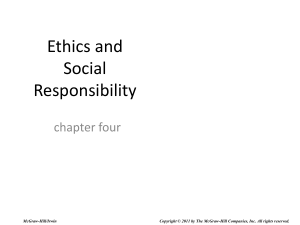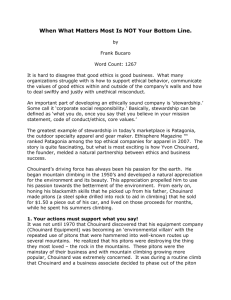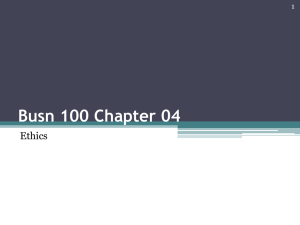Business Ethics
advertisement
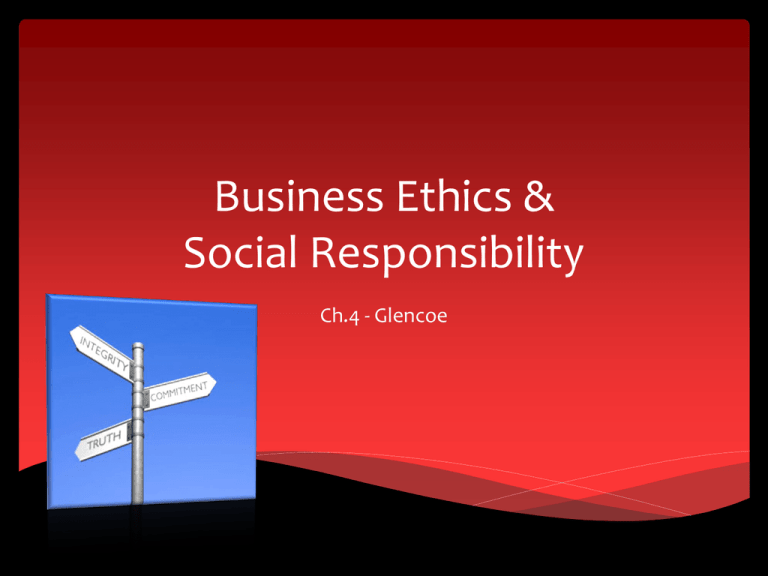
Business Ethics & Social Responsibility Ch.4 - Glencoe What is Ethics? Ethics – is the set of moral principles by which people conduct themselves personally, socially, or professionally. Business Ethics – is a set of guidelines about how a business should conduct itself. Must operate legally, ethically, and humanely History Spotlight March 26, 1911 146 workers – mostly young Eastern European women – died in a fire at the Triangle Shirtwaist Factory Company in NYC One of the worst industrial tragedies in US history Inadequate exit doors and fire escapes Overcrowded factory Led to people jumping to their deaths or burning alive Sweatshops – are factories that have unsafe working conditions, treat workers badly, and pay poorly Legal Responsibility Occupational Safety and Health Administration (OSHA) – is a division of the Department of Labor that sets and enforces work-related health and safety rules Other independent agencies: protect consumers monitor broadcast communications address discrimination in the workplace Legal Responsibility Most business police themselves by distributing a code of ethics Code of Ethics – is a set of guidelines for maintaining ethics in the workplace Can cover everything from employee behavior to environmental safety Professional groups, such as doctors, lawyers, journalists, and teachers, have their own codes Off the Beaten Path Up for longboard surf contest at Guethary? What about mountaineering at Yosemite? Before you surf or climb, Patagonia – the outdoor outfitter – asks you to first remember nature. Why should a company make a vested interest in nature over its product? Ethics as Good Business Operating with unethical business practices can mean: a business is lying offering merchandise it knows to be substandard Treating customers unfairly Violate government regulations = fine or jail time Violate company code of ethics = fired or lose license Treating employees unfairly can affect efficiency Important Ethical Questions Endless series of relationships: Buyer & seller Employer & employee Business & government Business & society When considering a questionable course of action, ask yourself: Is it against the law? Does it violate company or professional policies? What if everyone did this? How would I feel if someone did this to me? Am I sacrificing long-term benefits for short-term gains? Making Decisions on Ethical Issues 1. 2. 3. 4. 5. Identify the ethical dilemma Discover alternative actions Decide who might be affected List the probable effects of the alternatives Select the best alternatives Review 1. How do companies benefit by enforcing their own code of ethics? 2. Why does it pay to treat customers ethically? 3. What are some important ethical questions to ask? Off the Beaten Path As the designer of a fleece jacket made from a 2-liter soda bottle, Patagonia distributes clothing and equipment that’s environmentally responsibility. How does the consumer pay for a company’s inventions? Social Responsibility Social Responsibility – is the duty to do what is best for the good of society Takes into consideration all that business does or does not to solve problems of society Business have an ethical obligation to: Provide safe products Create jobs Protect the environment Contribute to the overall standard of living Conflict of Interest – is when a business is tempted to put profits before social welfare Example: CDs being stolen = charging more for products Responsibility to Customers Food and Drug Administration (FDA) - a government agency, protects consumers from dangerous or falsely advertised products Example: 1982 John & Johnson - poisonous Tylenol Cost = $100 million dollars Responsibility to Customers Companies conspire to control a market segment (unethical behavior) Consumers have less choice and pay more Example: 1940s, major film studios – owned all theaters which resulted in the smaller studios unable to show films (but were still able to make) Responsibility to Employees Business provide work experience Develop skills and confidence levels to continue success Volunteerism is another way business tackle societal problems Business have a social responsibility to create jobs Provide safe working conditions, equal treatment, and fair pay Responsibility to Employees Government has created laws to protect workers from child labor abuses to the rights of workers to organize Equal Pay Act – (passed in 1964) requires that men and women be paid the same wages for doing equal work Americans with Disabilities Act – bans discrimination against persons with physical or mental disability Off the Beaten Path Patagonia believes if you bear witness to an injustice, you must take action. Become an environmental activist by writing letters to the editor of a local newspaper, shopping selectively, boycotting, and reducing personal consumption. What are social issues you’re interested in pursuing? Responsibility to Society Polluting the Environment = ethical business issue Environmental Protection Agency (EPA) – a federal agency, created in 1970, that enforces rules that protect the environment and control pollution Sets pollution standards set by the government for air, water, or land Examples: The Body Shop – biodegradable materials, The Los Angeles Times – recyclable paper and soy-based ink, Honda & Toyota – eco-friendly cars Review 1. Define social responsibility. 2. What is conflict of interest? 3. What do companies adopt in the workplace to treat their workers fairly? Off the Beaten Path Patagonia responsibility takes a stand against genetically modified organisms (GMO). Its position states that companies must be held accountable if any GMO released into the environment causes damage. What government agency has a responsibility to society?





